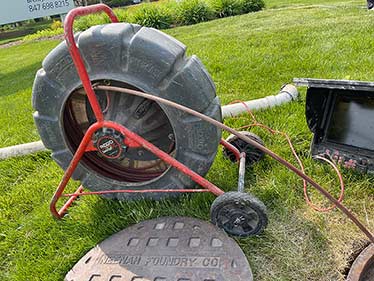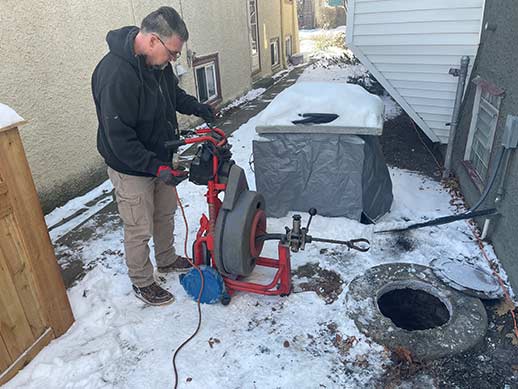With winter comes a plethora of challenges, and one of the most common ones faced by homeowners and property managers is dealing with clogged sewers. The drop in temperature, combined with the increased precipitation, can lead to blocked sewer lines, causing numerous headaches and potential damage to your property. In this article, we will highlight the essential steps for winter sewer rodding, ensuring that you maintain a clear passage and prevent any costly issues.
Understanding Winter Sewer Rodding
Before delving into the essential steps, it is crucial to grasp the concept of sewer rodding and its significance during the winter months. Sewer rodding involves the use of specialized equipment, such as drain rods and high-pressure water jetting, to clear obstructions and blockages within the sewer lines. This process is vital in preventing backups, sewage spills, and potential damage to your property.
The Impact of Winter on Sewer Lines
Winter weather conditions can significantly affect sewer lines, making them more susceptible to blockages. Some of the key factors contributing to this include:
- Freezing Temperatures: When temperatures drop below freezing, water in the sewer lines can freeze, leading to the formation of ice blockages. These ice blockages restrict the flow of wastewater and can eventually cause backups if not addressed promptly.
- Increased Precipitation: Winter often brings heavy rainfall or snowfall, resulting in excessive water entering the sewer system. This overload of water can overwhelm the pipes, leading to clogs and sewer line issues.
- Tree Root Intrusion: Tree roots seek out sources of water and nutrients, making sewer lines a prime target. During winter, when the ground freezes, roots may grow deeper into the soil, potentially penetrating sewer lines and causing obstructions.

Professional sewer inspections utilize state-of-the-art equipment, such as closed-circuit television (CCTV) cameras, to detect blockages, cracks, or leaks within the sewer lines.
Essential Steps for Winter Sewer Rodding
1. Regular Sewer Inspections
Prior to the onset of winter, it is crucial to conduct regular sewer line camera inspections to identify any existing issues or potential problem areas. Professional sewer inspections utilize state-of-the-art equipment, such as closed-circuit television (CCTV) cameras, to detect blockages, cracks, or leaks within the sewer lines. By addressing these issues proactively, you can prevent more extensive damage and costly repairs down the line.
2. Clearing Debris and Leaves
Before winter arrives, it is essential to clear any leaves, debris, or other organic matter that may have accumulated in and around the sewer openings. These can potentially clog the sewer lines and contribute to blockages. Regular maintenance, such as sweeping or raking away foliage, ensures a clearer passage for wastewater during the winter months.
3. Insulate Sewer Lines
Insulating exposed sewer lines is another vital step in maintaining a clear passage during winter. Insulation helps to prevent freezing of the wastewater within the pipes, reducing the risk of ice blockages. Common insulation materials include foam pipe sleeves, heat tape, or fiberglass insulation. Ensure that all vulnerable sections of the sewer lines are adequately insulated to protect them from the frigid temperatures.
4. Remove Snow and Ice
In areas with heavy snowfall, it is essential to keep the sewer openings clear of snow and ice buildup. Accumulated snow can obstruct the flow of wastewater, leading to potential backups and sewage spills. Regularly remove snow and ice from around the sewer access points, ensuring that they remain unobstructed and allowing wastewater to flow freely.
5. Avoid Pouring Grease and Oil Down Drains
One of the primary causes of sewer line blockages is the improper disposal of grease, oil, and cooking fats. These substances can solidify and congeal within the pipes, narrowing the passage and causing clogs. During the winter months, when the wastewater is more prone to freezing, it becomes even more critical to avoid pouring these substances down the drains. Dispose of them in a separate container and dispose of them properly.
6. Proper Use of Drains
Educate household members or occupants on the appropriate use of drains to minimize the risk of sewer line blockages. Encourage them to avoid flushing non-biodegradable items, such as wet wipes, sanitary products, or paper towels, down the toilet. Additionally, install drain strainers or screens to catch any potential debris or solids before they enter the sewer system.
7. Professional Sewer Rodding Services
If you encounter persistent or severe sewer line blockages during winter, it is advisable to seek professional sewer rodding services. Trained technicians can utilize advanced equipment to efficiently clear the blockages and ensure a clear passage for wastewater. Professional rodding services not only address the immediate issue but also help identify any underlying problems that may necessitate further repairs or maintenance.
8. Regular Maintenance and Upkeep
Maintaining a clear passage in your sewer lines requires consistent upkeep and preventive measures throughout the winter season. Regularly check for any signs of blockages, such as slow drains, gurgling noises, or foul odors. Promptly address any minor issues before they escalate, and follow a regular maintenance schedule to keep your sewer lines in optimal condition.
In Summary
Winter sewer rodding is a crucial aspect of property maintenance, ensuring a clear passage for wastewater and preventing costly and disruptive sewer line issues. By following the essential steps outlined in this article, such as regular inspections, clearing debris, insulating sewer lines, and seeking professional rodding services when necessary, you can safeguard your property and maintain efficient sewer functionality throughout the winter months. Remember, a proactive approach to sewer maintenance can save you from significant headaches and expenses in the long run.
